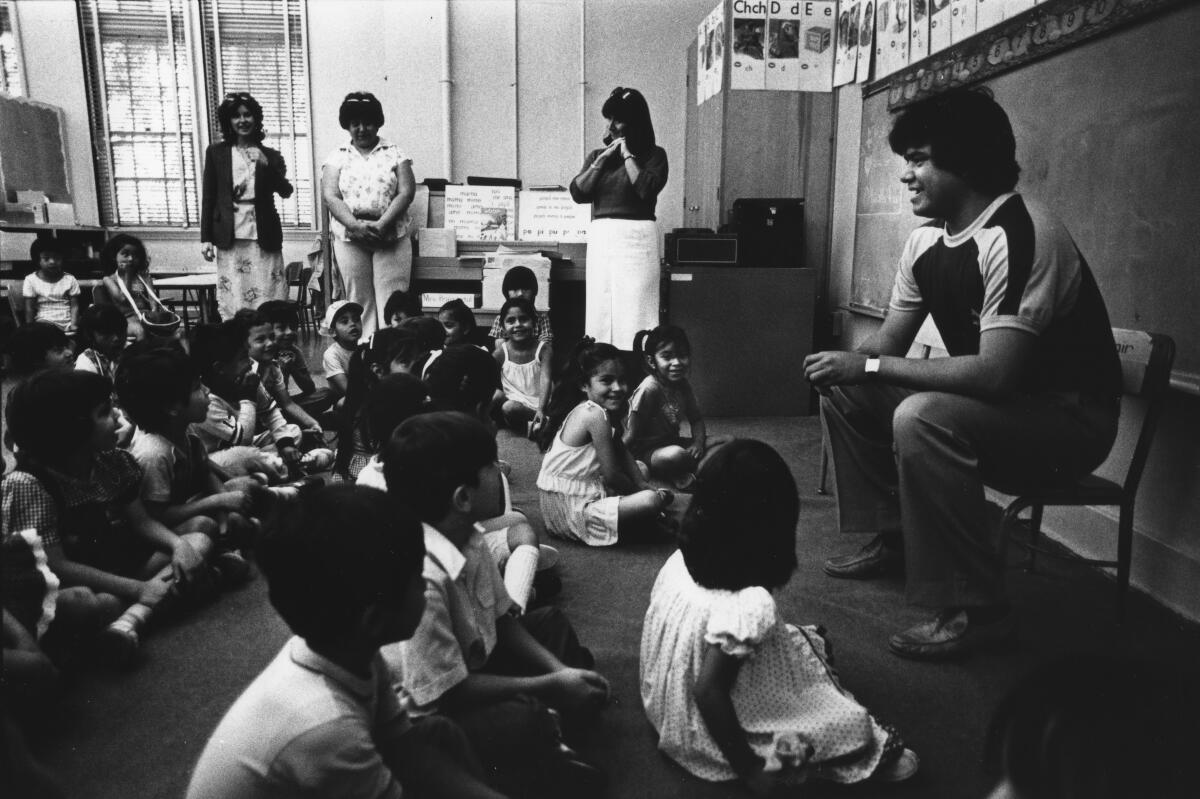Latinx Files: Long live Fernando Valenzuela

Is it just me, or does it feel oddly fitting that we lost Fernando Valenzuela as Día de Muertos celebrations are kicking off in Los Angeles? I can’t think of an Angeleno more worthy of collective mourning and celebration than the former Dodgers great, who died Tuesday at the age of 63 of an unknown cause.
Fans have already made makeshift shrines to honor him outside of Dodger Stadium, and in front of an apartment building in Boyle Heights that will soon feature a mural of the Mexican pitcher by artist Robert Vargas — the project is slated to be completed Nov. 1, which would have been Valenzuela’s 64th birthday and also marks the start of Día de Muertos. The Dodgers announced that they will wear a patch on their uniforms in his honor as they face the New York Yankees in this year’s World Series.
Los Angeles is paying tribute to Valenzuela, as it should. His magical 1981 rookie season — it began with an impressive 8-0 run and was capped off with a World Series ring, as well as National League Rookie of the Year and Cy Young honors — forever transformed the makeup of the Dodgers’ fan base. Before his arrival, many Latinos in Los Angeles swore to never support the team after it built a stadium on land that used to be the Mexican American neighborhoods of La Loma, Palo Verde and Bishop.

Before Fernando Valenzuela, Los Doyers didn’t exist. His dominance on the mound let the whole world know that this city, this team and the national pastime belonged to us, too. He was a hero to Mexicans and Mexican Americans in a time when there weren’t many of them who looked like us.
“He legitimizes our existence here in the United States,” Manuel Gomez, a former college administrator, said of Valenzuela to The Times in a 1983 story about the lack of Latino role models in Southern California, adding that the pitcher’s accomplishments made the rest of us look good in the public eye.
You’re reading Latinx Files
Fidel Martinez delves into the latest stories that capture the multitudes within the American Latinx community.
You may occasionally receive promotional content from the Los Angeles Times.
“He is a Mexican, who most middle-class whites think of as a lowly form bent over in a farm field,” Gomez said. “Yet, this Mexican, this lowly bastard, came to the United States and conquered the gringo in the quintessential American sport.”
His life is truly the stuff of movies. Valenzuela grew up poor in Etchohuaquila, Mexico, the youngest of 12 children. He was plucked from obscurity by Dodger scout Mike Brito, and was a national phenomenon as a 20-year-old. He made into reality the Angeleno dream of being from nowhere, coming to this city and becoming someone. It also didn’t hurt that despite being a world class athlete, he looked like us. Valenzuela was pudgy and baby-faced.
“Fernando is the uncle who made good,” playwright Luis Alfaro said in 2021. “He is the relative who is forever a superstar. He’s immortalized, he’s the María Félix of sports.”
Valenzuela knew his worth and wasn’t afraid to ask what was his. After his phenomenal rookie season, he held out of training camp and demanded a higher salary, pointing to the many new fans he had attracted. In 1986, he became the highest paid pitcher in the majors after signing a three-year contract worth $5.5 million. Even then, it was a bargain for the Dodgers, who have been collecting dividends for generations because of him.
Over the years, several of my colleagues have made the argument that despite lacking the career stats, Valenzuela should be inducted into the National Baseball Hall of Fame because of his contributions to the sport. It’s a sentiment I completely agree with, but if we’re being honest, we don’t need some plaque in an upstate New York museum so few of us will ever actually visit to remind us of Valenzuela’s greatness. That’s because for as long as the Dodgers play in Los Angeles, and for as long as there are Latinos in this city, his legacy will live on forever.
More Fernando Valenzuela coverage:
- Obituary: Dodgers star Fernando Valenzuela, who changed MLB by sparking Fernandomania, dies at 63
- Jaime Jarrín on Fernando Valenzuela: ‘He was so smart. ... He was a marvel, really’
- Dylan Hernandez: Fernando Valenzuela exuded quiet pride, understated dignity and a high baseball IQ
- Gustavo Arellano: Why Fernando Valenzuela’s magic should ensure him a spot in the Hall of Fame
- Robert Vargas began Fernando Valenzuela mural on the day the Dodgers great died. It’s become an altar
- Fans at Dodger Stadium and around L.A. honor Fernando Valenzuela
- Latino fans recall the importance of Fernando’s Dodgers career
- Essay: The Dodgers retired Fernando’s No. 34. These songs honor his legacy
- Documentary series: Fernandomania @ 40
- Dodgers Dugout: Remembering Fernando Valenzuela
Consider subscribing to the Los Angeles Times
Your support helps us deliver the news that matters most. Become a subscriber.

Our Día de Muertos digital altar is back!
In 2021, my colleagues Martina Ibanez-Baldor, Vanessa Martínez and I created a tool for Día de Muertos that allowed readers to make an ofrenda for a loved one who has passed. The impetus for this project was the cancellation of events across Southern California celebrating the Mexican holiday as a result of the COVID-19 pandemic. Our hope was to create a digital space where people could communally mourn and celebrate their dead in the absence of a physical one.
Suffice it to say, the project resonated with readers, and we’ve been doing it ever since. On Tuesday, we launched the fourth iteration of the project, which you can find here. To participate, all you have to do is upload a photo of a loved one — whether it be a person or a pet — to the tool and leave a message (230 characters or less) for them. Please allow a few hours for your ofrenda to appear on our digital altar. We will be closing submissions at 5 p.m. PT on Nov. 1.
Stories we read this week that we think you should read
Jorge Gutierrez bet on ‘The Book of Life.’ It’s still winning 10 years later
Writer-director Jorge Gutierrez’s “The Book of Life” portrayed Day of the Dead on the big screen in 2014. The Academy Museum will host a screening Nov. 2.
Latino Theater Company celebrates ‘Encuentro’ festival’s 10th anniversary
For the next three weeks, the downtown theater nonprofit is hosting performance groups from all over the country to share their stories of Latinidad onstage.
Inside Gustavo Santaolalla’s new Spanish ‘Dracula’ score for L.A. Opera’s live show
Composer Gustavo Santaolalla talks about taking on the 1931 classic Spanish “Dracula” score. The Oscar winner takes the United Theater on Broadway stage with the L.A. Opera orchestra.
How East L.A. band Las Cafeteras brings together music and activism
On the People’s Party tour, Las Cafeteras showcases a new side to the folk group. Playing tracks off its latest album, “A Night in Nepantla,” the East L.A. band shares its politically charged sounds of “brown futurism” across the country.
Dailyn Rodriguez wanted to tell Latino stories. With ‘The Lincoln Lawyer’ she can
Co-showrunner Dailyn Rodriguez was tired of the same Latino Hollywood script. Enter “The Lincoln Lawyer,” Netflix’s popular series displaying the complexities of L.A. and its Latino majority.
The Latinx experience chronicled
Get the Latinx Files newsletter for stories that capture the multitudes within our communities.
You may occasionally receive promotional content from the Los Angeles Times.




